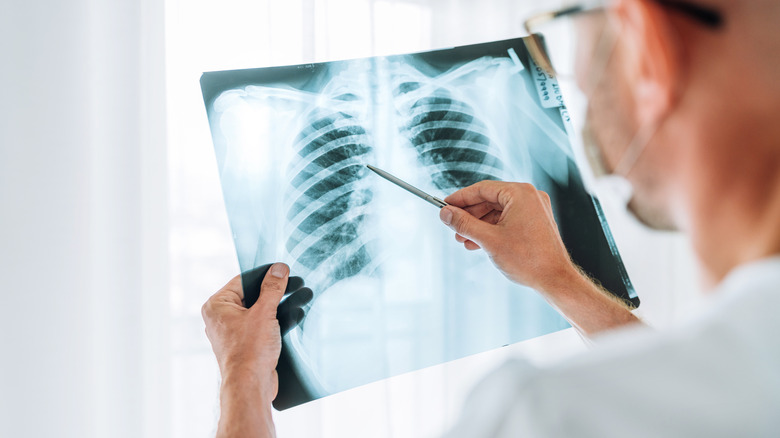What Percentage Of Smokers Develop Lung Cancer?
Smoking cigarettes isn't nearly as common now as it was a few decades ago, yet it's still a habit practiced by over 12% of American adults, according to the CDC. We've known about the dangers of smoking for a while now, and one of those dangers includes lung cancer. So what's the connection between cigarette smoking and lung cancer?
The lungs are critical organs, responsible for taking in oxygen when you inhale and releasing carbon dioxide when you exhale (via Mayo Clinic). If cancer develops in the lungs, you may not notice any signs right away. Once the disease progresses, symptoms might include a persistent cough, coughing up blood, shortness of breath, chest pain, hoarseness, weight loss, bone pain, and headache. Among global cancer deaths, lung cancer is the leading cause.
If you experience symptoms and are concerned, your doctor may run tests like an X-ray, CT scan, or MRI, or take a biopsy to check for cancer cells (via Medical News Today).
How smoking and lung cancer are related
If you've ever smoked cigarettes before, you already have an increased risk of developing lung cancer (via CDC). But the longer you smoke and the more cigarettes you smoke per day, the more your risk increases. Since nicotine is highly addictive, this can be hard to avoid, but it's important. Smoking cigarettes is the biggest risk for lung cancer — it's responsible for up to 90% of all lung cancer deaths. Among current smokers, 10-15% will go on to develop lung cancer, according to Verywell Health.
The smoke from tobacco use contains over 7,000 chemicals, 70 of which are known to cause cancer, per CDC. Even secondhand smoke can cause lung cancer. Since the chemicals in cigarette smoke influence the way that the cells of the lungs grow and divide, even smoking occasionally puts your lungs at risk (via MedicineNet). They also cause inflammation, preventing the lungs from repairing the damage over time. The best way to reduce your risk of lung cancer is to quit smoking, no matter your age.


